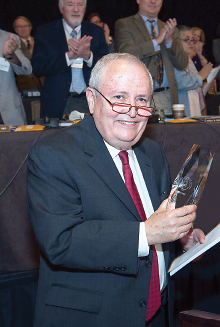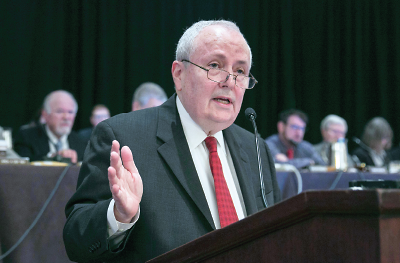Fight Against Misuse of Psychiatry Wins Sharfstein Award for Courage
Abstract
A former APA president’s stalwartness in protecting the integrity and ethical values of psychiatry earns him one of APA’s most prestigious awards.
His years-long battle against ethical violations in psychiatry to support the highest ethical standards in psychiatry, including not participating in torture and prisoner interrogations, was a “no brainer,” maintained Steven Sharfstein, M.D. However, a substantial number of his colleagues believe he showed tremendous courage and chose to bestow on him the APA 2015 Assembly’s Profile of Courage Award last month in Washington, D.C.

Former APA President Steven Sharfstein, M.D., recounts the numerous issues with which he dealt during his 2005-2006 term. Recalling actor Tom Cruise’s remarks against psychiatry in a June 2005 “Today” show appearance, he said, “Mr. Cruise might be a halfway decent actor, but in terms of playing doctor, he is totally irresponsible.”
Sharfstein, who is president and CEO of Sheppard Pratt Health System in Baltimore, was president of APA for the 2005-2006 term, and fighting against instances in which he saw the potential misuse of psychiatry was a hallmark of his presidential year.
The description accompanying his Profile of Courage Award documents the difficult but consequential issues that he confronted, noting, for example, that he recognized concerns raised by the participation of psychiatrists in interrogation teams grilling suspected terrorists imprisoned by the U.S. military at Guantanamo Bay, Cuba, and was willing “to stand firm in the face of opposition by the nation’s military and civilian leadership” to halt the participation of psychiatrists in this practice. The award cites as well his prominent role in having APA develop an official position “stating categorically that psychiatrists should not participate in the commission of torture or participate directly in the interrogation of persons held in custody” and his efforts to amend APA’s ethical guidelines “to explicitly oppose such practices.”
Sharfstein added in an interview with Psychiatric News that several colleagues were “essential” to the adoption of the APA policy, particularly Paul Appelbaum, M.D., members of the Council on Psychiatry and Law, Board members Lawrence Hartmann, M.D., and David Fassler, M.D., and Assembly Speaker Joseph Rubin, M.D.
Soon after the statement was released, the Department of Defense agreed that going forward, it would seek the help of psychologists, not psychiatrists, when it wanted advice on how to elicit information from detainees. The American Psychological Association had taken a more permissive stance on the issue (Psychiatric News, July 7, 2006).
Sharfstein was invited to participate in an October 2005 trip to Guantanamo Bay prison along with the U.S. surgeon general and medical and mental health leaders after he wrote a letter to Pentagon officials expressing APA’s significant concerns about the participation of psychiatrists in providing consultations to military interrogators.

Former APA President Steven Sharfstein, M.D., addresses the APA Assembly last month in Washington, D.C., after he was presented with the Assembly’s Profile of Courage Award. He was honored for his ethics stand against psychiatrists’ involvement in the interrogation or torture of prisoners and other difficult issues with which he grappled during his presidency.
He pointed out to the Assembly representatives that other issues that arose during his presidential term required perhaps more courage than his battles involving misuses of psychiatry. For example, APA leaders were debating, and then voted to enact, a formal policy backing the right of same-sex couples to civil marriage, which among some in the membership and the larger community was a controversial move, though one that APA leaders backed because of the mental health consequences of federal and state policies forbidding these individuals to formalize their unions. Also during Sharfstein’s presidential term, the government was finalizing the regulations controlling prescription drug plans under Medicare Part D, which had passed in 2003 but was not implemented until the beginning of 2006. “The transition to Medicare Part D has been quite rocky,” Sharfstein observed at the time, and APA undertook a study to see to what extent disruptions in care had led to poor outcomes for psychiatric patients.
In the realm of issues with which he never expected to have to deal, there was actor Tom Cruise, who turned the publicity tour for his new movie, “War of the Worlds,” into a war of words between psychiatry and the Church of Scientology. Cruise, one of Scientology’s most visible adherents, had been using the tour as a forum in which to disparage psychiatry, dismiss the reality of mental illness, and condemn the use of psychotropic medications. The controversy ratcheted into high gear after a June 2005 “Today” show appearance in which Cruise condemned actress Brooke Shields for taking the antidepressant Paxil to combat postpartum depression.
Shields had previously disclosed the psychiatric treatment she received and benefited from after the birth of her daughter and wrote a book about her experiences. Cruise said in response to Shields’ disclosure, “These drugs are dangerous. I have actually helped people come off them. When you talk about postpartum depression, you can take people today, women, and what you do is use vitamins.”
Sharfstein and other APA leaders gave multiple interviews in the ensuing days, repeatedly making the point that psychiatric drugs are safe and effective treatments and that Cruise’s comments had the potential to cause serious harm to those who avoided treatment after hearing his rant. As Sharfstein said on the “Today” show the day after Cruise’s appearance, “Mr. Cruise might be a halfway decent actor, but in terms of playing doctor, he is totally irresponsible.”
As Sharfstein noted in his final Psychiatric News column as APA president, psychiatry always seems to be in the eye of the hurricane. With the Profile of Courage Award, his APA colleagues recognized him as one of the field’s leading hurricane fighters. ■



